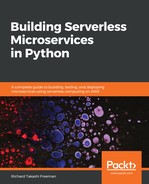You can think of service computing as focusing on business logic rather than on all the infrastructure-configuration management and integration around the service. In serverless computing, there are still servers, it's just that you don't manage the servers themselves, the operating system, or the hardware, and all the scalability is managed by the cloud provider. You don't have access to the raw machine, that is, you can't SSH onto the box.
The benefits are that you can really focus on the business logic code rather than any of the infrastructure or inbound integration code, which is the the business value you are adding as an organization for your customers and clients.
In addition, the security is managed by the cloud provider again, auto-scaling and the high availability options also managed by the cloud provider. You can spin up more instances dynamically based on the number of requests, for example. The cost is per execution time not per idle time.
There are different public cloud serverless offerings. Google, Azure, AWS, and Alibaba cloud have the concept of Functions as a Service (FaaS). This is where you deploy your business logic code within a function and everything around it, such as the security and the scalability, is managed by the cloud provider.
The drawback is that these are stateless, which means they have a very short lifetime. After the few minutes are over, any state maintained within that function is lost, so it has to be persisted outside. It's not suitable for a long-running processes. It does have a limited instance type and a duration too. For example, AWS Lambdas have a duration of 15 minutes before they are terminated. There's also constraints on the actual size of the external libraries or any custom libraries that you package together, since these lambdas need to be spun up very quickly.
